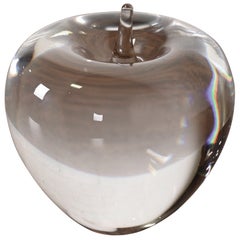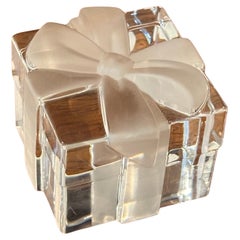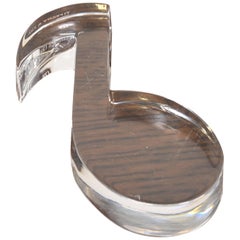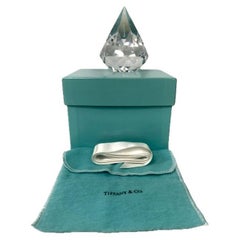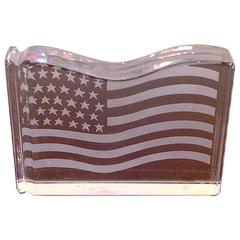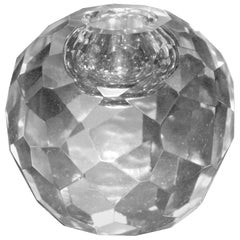Tiffany Crystal Paperweight
Late 20th Century American Modern Paperweights
Crystal
Late 20th Century German Modern Paperweights
Crystal
Late 20th Century American Modern Paperweights
Crystal
21st Century and Contemporary Hollywood Regency Paperweights
Crystal
Late 20th Century Japanese Modern Paperweights
Crystal
Recent Sales
Late 20th Century American Modern Paperweights
Crystal
Late 20th Century American American Classical Paperweights
Crystal
Vintage 1970s American Modern Glass
Crystal
Vintage 1980s Modern Paperweights
Crystal
21st Century and Contemporary German Modern Paperweights
Crystal
21st Century and Contemporary American Modern Paperweights
Crystal
Early 2000s German Modern Paperweights
Crystal
Late 20th Century Post-Modern Paperweights
Crystal
Vintage 1980s American Modern Paperweights
Crystal
Late 20th Century American Paperweights
Art Glass
20th Century American Post-Modern Figurative Sculptures
Crystal
Mid-20th Century American Paperweights
Crystal
Tiffany & Co. for sale on 1stDibs
Tiffany & Co. is one of the most prominent purveyors of luxury goods in the United States, and has long been an important arbiter of style in the design of diamond engagement rings. A young Franklin Delano Roosevelt proposed to his future wife, Eleanor, with a Tiffany ring in 1904. Vanderbilts, Whitneys, Astors and members of the Russian imperial family all wore Tiffany & Co. jewelry. And Jacqueline Kennedy Onassis preferred Tiffany china for state dinners at the White House.
Although synonymous with luxury today, the firm started out rather modestly. Charles Lewis Tiffany and John B. Young founded it in Connecticut as a “stationery and fancy goods emporium” in 1837, at a time when European imports still dominated the nascent American luxury market. In 1853, Charles Tiffany — who in 1845 had launched the company’s famed catalog, the Blue Book, and with it, the firm’s signature robin’s-egg blue, which he chose for the cover — shifted the focus to fine jewelry.
In 1868, Tiffany & Co. gained international recognition when it became the first U.S. firm to win an award for excellence in silverware at the Exposition Universelle in Paris. From then on, it belonged to the pantheon of American luxury brands.
At the start of the Gilded Age, in 1870, Tiffany & Co. opened its flagship store, described as a "palace of jewels" by the New York Times, at 15 Union Square West in Manhattan. Throughout this period, its designs for silver tableware, ceremonial silver, flatware and jewelry were highly sought-after indicators of status and taste. They also won the firm numerous accolades, including the grand prize for silverware at the Paris Exposition of 1878. Among the firm’s glittering creations from this time are masterworks of Art Nouveau jewelry, such as this delicate aquamarine necklace and this lavish plique-à-jour peridot and gold necklace, both circa 1900.
When Charles Lewis Tiffany died, in 1902, his son Louis Comfort Tiffany became the firm’s design director. Under his leadership, the Tiffany silver studio was a de facto design school for apprentice silversmiths, who worked alongside head artisan Edward C. Moore. The firm produced distinctive objects inspired by Japanese art and design, North American plants and flowers, and Native American patterns and crafts, adding aesthetic diversity to Tiffany & Co.’s distinguished repertoire.
Tiffany is also closely associated with diamonds, even lending its name to one particularly rare and exceptional yellow stone. The firm bought the Tiffany diamond in its raw state from the Kimberley mines of South Africa in 1878. Cut to create a 128.54-carat gem with an unprecedented 82 facets, it is one of the most spectacular examples of a yellow diamond in the world.
In a broader sense, Tiffany & Co. helped put diamonds on the map in 1886 by introducing the American marketplace to the solitaire diamond design, which is still among the most popular engagement-ring styles. The trademark Tiffany® Setting raises the stone above the band on six prongs, allowing its facets to catch the light. A lovely recent example is this circa-2000 platinum engagement ring. Displaying a different design and aesthetic (but equally chic) is this exquisite diamond and ruby ring from the 1930s.
Find Tiffany & Co. jewelry, serveware and decorative objects for sale on 1stDibs.
Finding the Right Paperweights for You
While any heavy object can be used to hold loose papers, there’s nothing as ornate yet perfectly functional as a paperweight. Antique, new and vintage paperweights can unobtrusively enhance the ambience of a room or act as a colorful conversation starter. On a desk or writing table, it can contribute a subtle sense of style.
Glass paperweights emerged in Europe in the mid-19th century. Early paperweight artisans like Venetian glassmaker Pietro Bigaglia often crafted them with a design on the inside. By the early 1900s, paperweight objects became even more popular through innovative iterations by artists like Louis Comfort Tiffany.
As the paperweight became both a luxury and utilitarian object, creators used a variety of materials to set their wares apart. Today, in addition to the classic glass versions, paperweights are made of metal, wood, ceramic and stone.
A vast selection of paperweights as well as a whole range of other desk accessories can be found on 1stDibs — browse by type, price, period, material or style, from Art Deco and Hollywood Regency to metal and glass. Reflecting their widespread appeal, paperweights are available in a diverse array from across the globe, including Italy, France and North America, as well as examples by leading designers and brands such as Fratelli Toso, William Guillon and René Lalique. Whether an office or a study needs a touch of something vintage or a mid-century modern twist, there are paperweights to suit every taste.
- 1stDibs ExpertAugust 17, 2021A Tiffany & Co. engagement ring can cost as little as $13,000 or as much as $500,000 depending on the center stone’s carat weight, the band material and whether or not there are any side stones. The smaller the stone, the cheaper the ring will be. Find engagement rings designed by Tiffany & Co. on 1stDibs.
